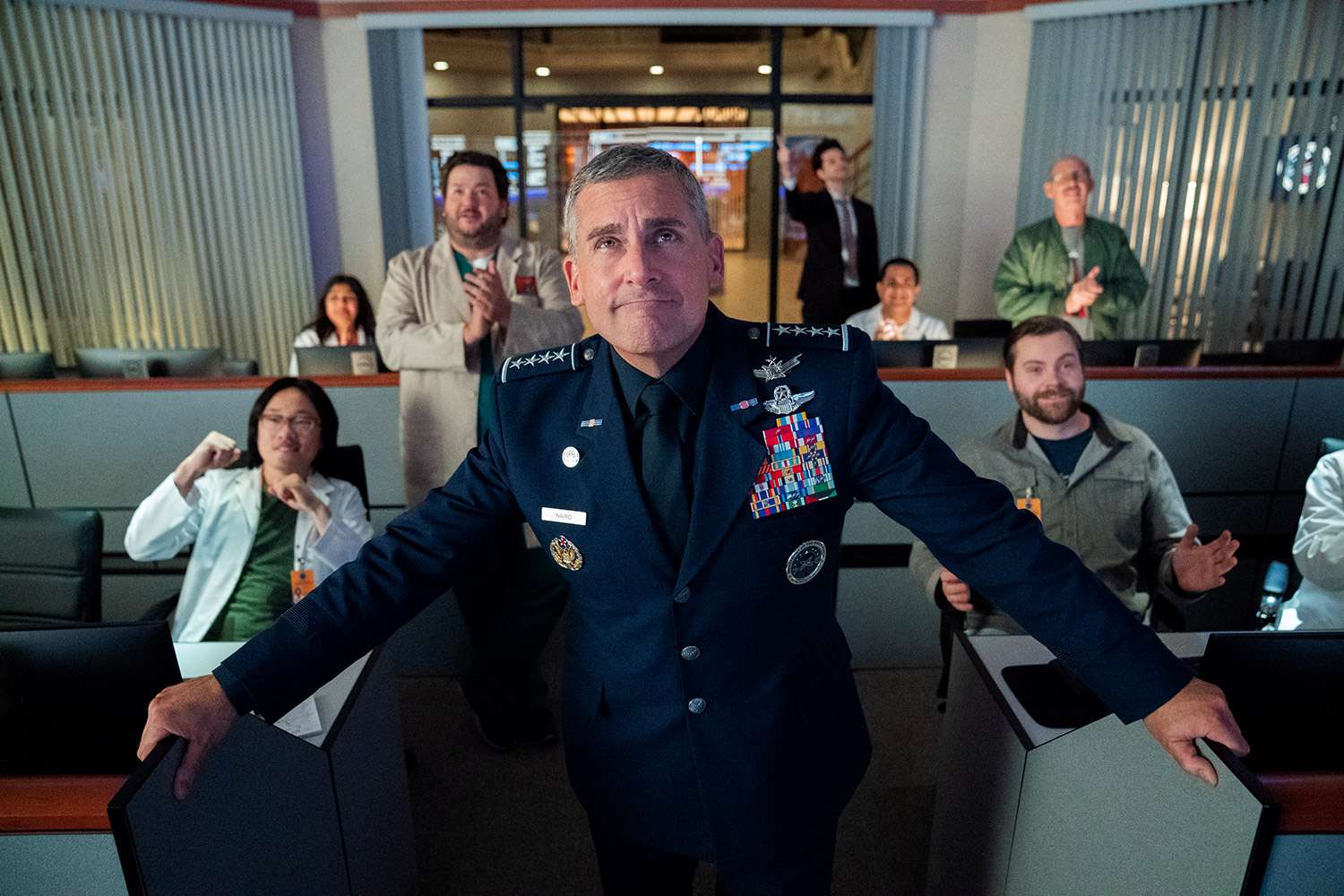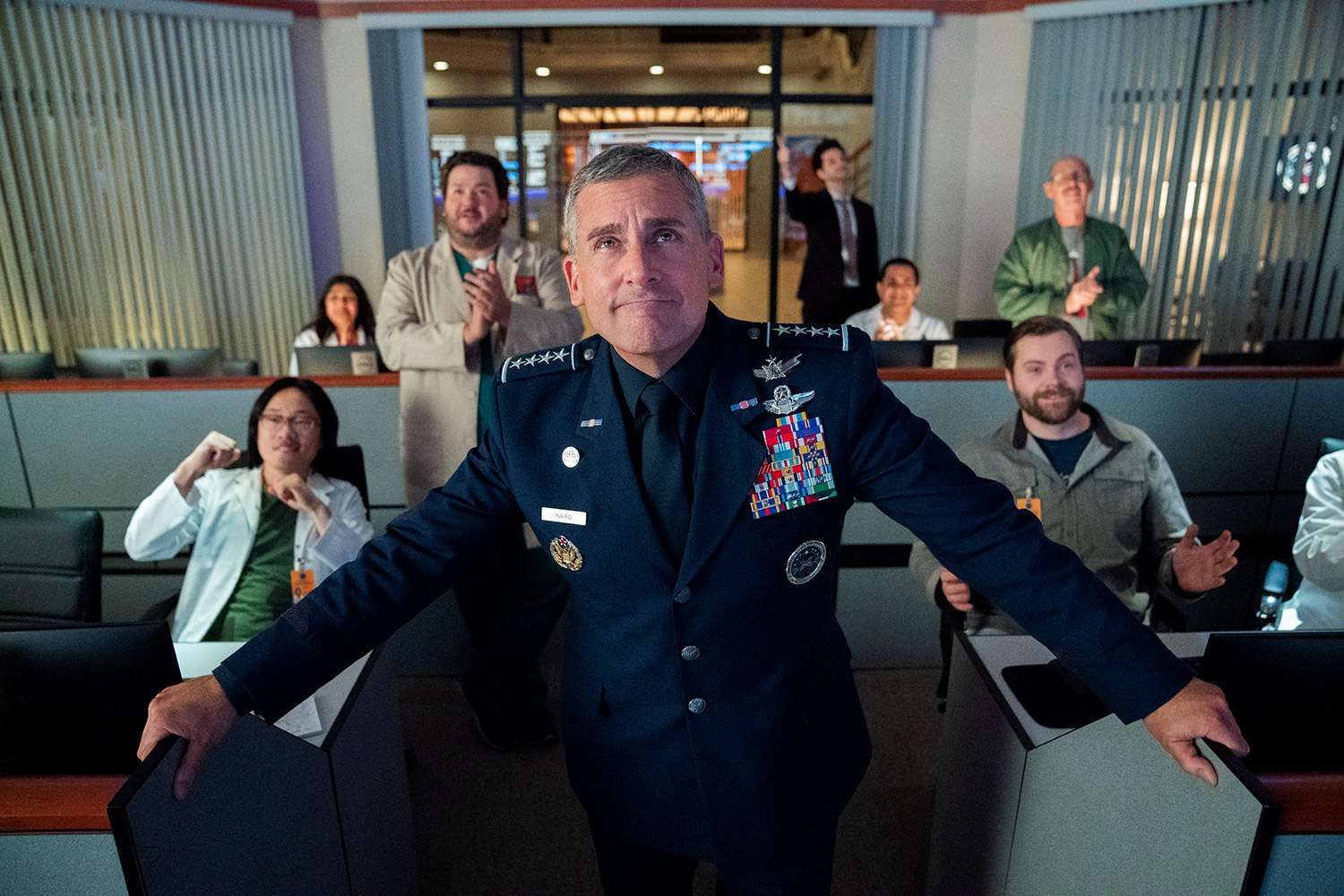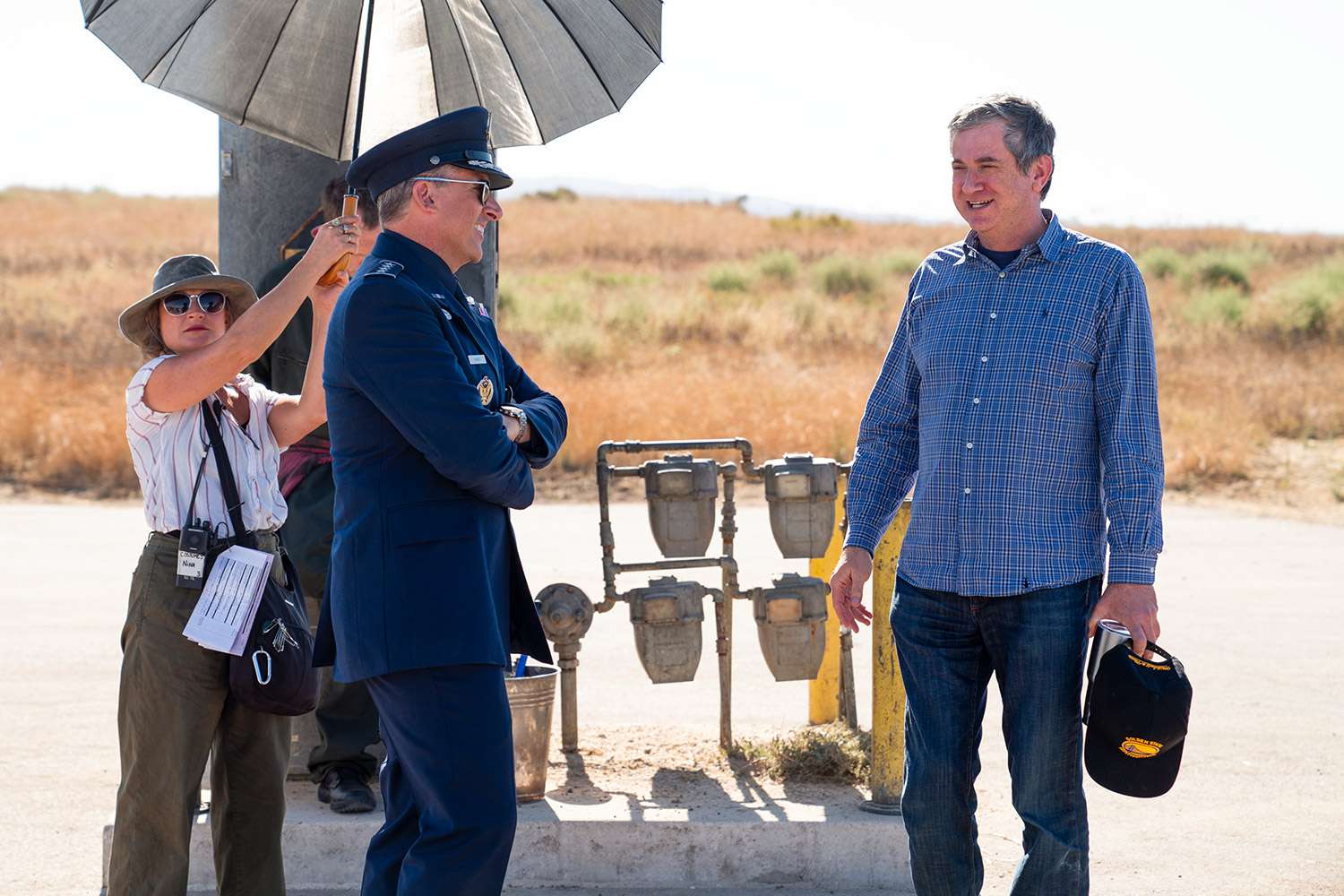
Greg Daniels has conquered the worlds of propane (King of the Hill), paper products (The Office), and local government (Parks and Recreation), and now he’s truly expanding his horizons and shooting for the stars with his next project: Space Force.
The writer-director-producer reunited with an old friend, Steve Carell, to create a new Netflix comedy (debuting May 29) that stars Carell as Mark R. Naird, an Air Force general who’s given a daunting-if-unsavory promotion to run this new branch of the military from a secret base in Colorado. Daniels & Co. filled the cast with notable names aplenty, including John Malkovich, Lisa Kudrow, Ben Schwartz, and Jane Lynch. Here, Daniels — who also lords over the new Amazon afterlife comedy Upload — explains how he abandoned his dreams of an aircraft carrier-based comedy for something better, what discoveries he made during the research process, and how he wouldn’t mind orbiting the comedy world with Carell for years to come.

Aaron Epstein/Netflix
ENTERTAINMENT WEEKLY: So, you receive a call from Steve, who tells you that he received a two-word pitch from Netflix: Space Force. What happened next?
GREG DANIELS: This very smart [Netflix] executive named Blair Fetter thought it would be a cool idea to do something about Space Force and just pitched the words “Space Force.” My first hearing of it was coming from Steve saying, “What would you think about a TV show called Space Force?” I would’ve been excited to get that call based on a lot of lesser concepts; it didn’t need to be such a good concept for me to be excited to work with Steve again. I immediately started thinking of ideas. And then we got together a bunch of times and talked and pitched things, and it just flowed very naturally. It is a really good idea for a show. I had always been wanting to make a military show as a genre, and I had been thinking of something set on an aircraft carrier, actually. This is better. There’s such wonderful cultural memories from landing on the moon, and there’s a feeling of “We really had our act together back then.” [Laughs] Everybody around the world was so excited for Neil Armstrong and “one giant leap for mankind.” There was definitely a feeling of more world unity. Now there’s so much more nationalism and everybody’s trying to get a piece of the moon, so it feels like a very good way to talk about stuff in the world.
What did the real-life Space Force represent to you? Why was it perfect fodder?
Part of it is looking at it through the lens of Steve Carell running it, you know? That’s partly what makes it comic. It’s a very ambitious thing to do what the goal is, which is: boots on the moon in 2024. That means that we actually have a base with soldiers living there, and it just feels very difficult in a funny way. And the other aspect is now that it’s becoming less about scientists and astronauts, and more military, what’s funny is just picturing the skill set of somebody who wasn’t expecting to be put in charge of something this technical. [Laughs] And it’s kind of cool because it hasn’t been defined what it is. The interesting thing is that the more research we did — and we went to SpaceX a bunch of times and we did a lot of research about it — I think that it isn’t crazy for the United States to want to have a Space Force. If there’s anything that’s a shame, it’s not that we’re insisting on having a Space Force, it’s that everybody in the world is rushing to do this in a competitive way [rather] than a cooperative way. And if we didn’t have one, according to all of our research, we would still need one because of other countries doing the same thing. As we worked on the show more, it kind of broadened a bit in terms of what we were writing about.
The way that Trump has presented this enterprise in real life — down to the Star Trek-ish logo [and now his talk of a “super duper missile”] — certainly seems a bit absurd…
The funny thing is, we had done a lot of the design work for the show before the actual Space Force released any of their design work. For instance, we had a logo already. We had our moon fatigues. When they released their fatigues, we released a photo of our fictional Space Force fatigues. And you know, the whole notion of camo fatigues for Space Force is comical. And there’s a lot of comedy because you have all these expectations that are coming from the Army and this stuff might be quite reasonable for being in outer space, but we have to get used to thinking of it in military terms and not in astronaut terms. I guess part of the point is it’s too bad that we have to be thinking of it in military terms and not in astronaut terms.
How would you describe the dynamic between Naird, a military loyalist who doesn’t quite trust science, and Mallory, a man for whom science is paramount?
They are opposites in a lot of ways. And part of the show is about them learning how to work together and influencing each other. You know the Master and Commander series? I haven’t read that in a long time, but [it’s the] idea of two guys who are pretty temperamentally different, but they’re trying to do something very ambitious, and at any moment it’s going to need the skills of one of them or the other — but they don’t necessarily know which. And it’s a constant struggle.
You don’t show the president in your series, but we hear references to his tweeting. And you have your versions of Nancy Pelosi and Alexandria Ocasio-Cortez, among others. How did you decide how closely to wink at our current political landscape?
We talked about Dr. Strangelove a good bit in the beginning. And certainly, the hope is that it isn’t this disposable product that a year and a half from now feels very dated because it’s all topical humor, right? We were more comfortable doing character comedy and it’s somewhat satiric, for sure, but it’s very positive about a lot having to do with the military. Do you remember Mad Dog [James] Mattis? When he became chief of staff, I know a lot of people were like, “Oh no, somebody named Mad Dog Mattis has become the chief of staff!” And there was some worry. And then by the time he left, there was worry that he was leaving because people were like, “This is a man of integrity, you know?” [Laughs] So I do think that we’re not playing the military is the butt of the joke at all. And Steve’s character has a lot of positives. He’s a little bit inflexible and his scientific education isn’t up to the task of running this thing. But on the other hand, he’s got a lot of good qualities as well.
[Our character named] Petosi — you never know how much people are aware of politics. I remember my first job was writing for Not Necessarily the News, and we got pretty deep into the news weeds on that a lot. But the producer would always say, “Remember that only 11 percent of America knows who the secretary of state is.” You don’t want to go too deep into it. So I think that we were pretty on the nose with the senators in the Congress, because you don’t know if anybody really is following that stuff closely enough to know who’s who. This is the world that the show is set in — because it’s a government agency, it’s going to interact with the government. I don’t think there’s any enormous point-scoring trying to happen here with these characters.
Steve called the show “surprisingly patriotic.”
When you think about going to space, there’s so much wonderful American history involved, and it is very inspiring to most people, which is probably why the president wants to be associated with it. But I don’t think there’s anything wrong with enjoying the inspirational aspects of it.

AARON EPSTEIN/NETFLIX
Your cast features Lisa Kudrow, John Malkovich, Ben Schwartz, Jane Lynch, Noah Emmerich, Fred Willard [who passed away last week, after this interview was conducted], Jimmy O.Yang, and Patrick Warburton, to name a few. Did you put out feelers to every funny and intriguing actor you knew and then suddenly find yourself with the most impressive cast of 2020?
Thank you. First of all, part of it is the announcement — that Steve was going to do a new comedy show — [which] was very early in the process. We hadn’t written anything yet; we had just talked about the concept with Netflix. Right away, John Malkovich’s agent called up and said he’d be interested in participating, so we were able to write the Mallory character with Malkovich in mind. For the Joint Chiefs, we were like, ‘They have to be of the same caliber that Steve is. The Joint Chiefs is the meeting of all of the heads of all the service branches. They’re all very impressive people, so if we’re going to cast comic people, they’ve got to be hefty comedy people.” Part of that was writing it in such a way that they could be shot together, and it wouldn’t spread too much as an experience. And the other thing is, of course, Alison Jones is a wonderful casting director. Something about the pitch — I think the different people got excited once they realized who else was going to be in the room with them.
Steve noted that it was fun to see people like John or Noah, actors you don’t immediately associate with comedy, in this new light.
Steve was really thinking about that from the beginning because we didn’t want to repeat The Office. In the shooting style, a lot of it was thinking about the subject matter and how inspiring or grand the subject matter is and wanting to shoot it in a big cinematic way. That kind of informed everything, including the music. We got [composer] Carter Burwell and a live orchestra. Space exploration is just a subject matter that’s big. And the other thing that’s cool is because [Steve] is playing a general who’s running a big government agency, the opportunities for him to bump into people of all different types and all different ages is enormous, but it’s a good show if you’re somebody in their 50s because there’s a lot of people running things in the government that are in that age range. So I think that’s where you’re getting a lot of these bigger names.
What other movies or shows did you talk about in the early stages?
A lot of the Ron Howard-scope movies like Apollo 13 came up. Or Armageddon. There have been a lot of movies about different aspects of our history in space. And books. We read Gene Kranz, who was the head of mission control. There was a good bit of research for it and it’s a great topic. It’s not hard to do research. It’s easier than researching the propane business.
What was the biggest challenge in building this world?
“What were we going to build?” Because you have to build a set and you can’t be out on location every day. And there’s so many things that [Mark] would interact with as the leader of a new branch of the armed forces. So we have done a lot of thinking about cool production design. We found this wonderful production designer, Susie Mancini, who just threw herself into researching everything to do with space design and graphics. And we were inspired by this famous production designer [Ken Adam] that did the early James Bond movies. You Only Live Twice — do you remember that hollowed-out volcano? He was actually the production designer for Dr. Strangelove as well. That was a very big build and it’s this two-story set with all these different screens. And part of them is based on our tour of SpaceX and how they have got this central giant launch room with these enormous screens, and it’s situated so that the whole group of them can get into the lobby and look through these glass walls at the launches. So probably the hardest part was really nailing down what the set was going to be like.
Your show has a chimpstronaut.
There’s a lot of familiar parts in the show, things that people know about the space race — The Right Stuff was another wonderful movie that I love so much — and people are familiar with the early space exploration being done by animals, dogs, and chimps. There is that aspect to it, so we do send up a dog and a chimp, for sure.
NASA may have sent up an animal before, but your chimp is asked to demonstrate an exceptional level of dexterity and skill.
The comedy in the episode is coming from this strong need that they have for this chimp to help out, and Mark seems to have a little bit of difficulty accurately assessing what chimps can do. [Laughs]
And that scene apparently required some acting on your part.
We were in the editing room after the thing was shot and the chimp was not on the set, so somebody had to fill out what the chimp was doing. The first thing that we tried was getting stock footage, and it was getting kind of frustrating. So one night, I took my iPhone and the editor filmed me doing the chimp’s part. Looking at early cuts, we gradually replaced all of my acting with the actual effects. But when Steve was giving notes in the early cuts, you’d be watching the show and then suddenly you would cut to me being a chimp and giving it my all.
When you started writing this show, how convinced were you that the real Space Force would happen? And how do you feel now, given the global pandemic?
I mean, who could have anticipated a pandemic and recession, right? So I don’t think necessarily everything needs to be about the pandemic. All of the issues that are in the show are not really pandemic-oriented . There’s a bit in there about the funding —
— of the U.S. Postal Service [which happened in real life]!
I know! That was crazy. One hopes that in a few years, the pandemic will be in the rear-view mirror, and the moon will still be there.
Now that your show is premiering during the pandemic, how do you think it will play?
Part of our goal was to make somebody in the military enjoy the show and not feel like some snotty Hollywood person was making fun of them. And in that respect, I was reminded of King of the Hill a lot working on this, because Mark is a conservative person from the military, but the show is trying to respect the world and get it right so that people who have a similar background are going to enjoy it. Which is not to say that it has to pick a side. We were trying to be an entertainment show that a lot of people can watch and, if anything, we’re hearkening back to the national excitement over the moon and trying to do that justice as a comedy.
What was it like to reteam with Steve after all these years? Had you guys been frequently bouncing ideas back and forth over the years?
We definitely met up a bunch of times talking about [how] it’d be great to do something again. And it’s wonderful for me to be back working with him because my longest and most satisfying professional experience was working and writing with him for seven years. The other part of it is that we’re pretty much the same age and we’re from the Northeast, and if there is somebody who matches my sensibility, I would say it would be him. It’s very easy to write for him. It’s a combination of a habit and instinct, [but] I also love writing for him because I like to write things that have layers to them and are complicated. Not every actor can play a bunch of things at the same time. To me, the magic of him is that you can see everything he’s doing. He can have one objective that he’s pursuing doggedly in the back of his head; he’s aware of something else horribly going wrong and you can see that on his face, and then he can be surprised by something new and remember something. It’s like you could just see all the different things at once — and he gets comedy out of all of them.
Which scenario is more likely: that you will next cross paths with Steve in some sort of revival of The Office when he’s a guest star, or that you two would create a third series that is completely different than anything?
Well, based on where he’s at, I would say that’s a question for him. I love to work with him. We got a great opportunity to end The Office well, so my guess is that he would not want to reopen that character. But, you know, if he ever felt that he wanted to reopen that character, I wouldn’t want somebody else writing it. [Laughs] I’m very comfortable writing for him, and I’m quite happy to run out the rest of my career writing for him, if that is what happens.
Related content:
| type |
|
| rating | |
| genre | |
| creator |
|
| network |
|

